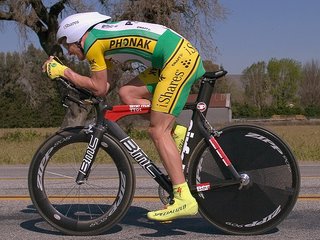
I like Floyd Landis’ chances of winning the Tour de France.
Even more, I favor the idea of a guy named Floyd winning a major sports event.
There aren't a lot of Floyds around today. According to aboutnames.ch Floyd is the 798th most popular male name in the United States. It seems to have derived from Old French and means “someone who lives near the forest” or in Old English, “the hollow.”
That makes sense to me. The name Floyd comfortably references a mid-20th Century rural or working class life and raises memories of humorous characters from old TV shows. Remember Floyd the barber on Mayberry RFD? Floyd is a name that says down-to-earth. Floyds are supposed to be just regular guys.
And so is Landis. Born to Mennonite parents in Farmersville, Penn., he’s a grinder who worked his way up in the cycling world, by, well, working. In fact he pushed himself so hard he’s already worn out one hip at age 30 and will get it replaced after the Tour concludes. Physicians and competitors are stunned that he can ride at all. Floyd just shrugs and keeps pushing pedals.
Landis’ image as well as his name contrast sharply with former teammate and cycling uber-star Lance Armstrong. (Lance is #232 on the favorite name list.) Glamorous, controversial and with a great comeback story behind him, Armstrong could be named Todd or Tad or Chip and no one would blink. But I’m willing to bet Sheryl Crow would never have told him C'mon, C'mon if he was dubbed Floyd Armstrong.
I don't denigrate Armstrong's achievements when saying I prefer to cheer on Floyd Landis from Farmersville, a regular guy who worked hard and finally is getting the recognition he’s due.
Go, Floyd, go.


